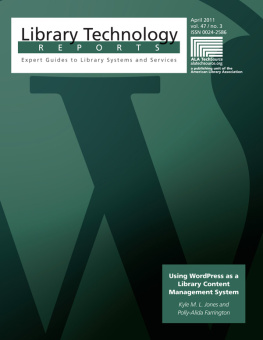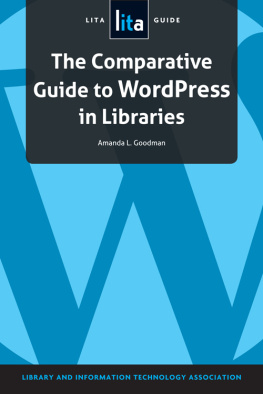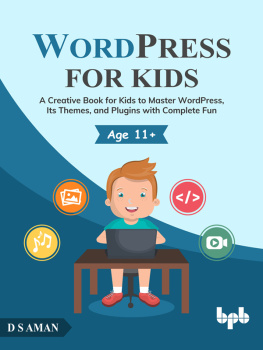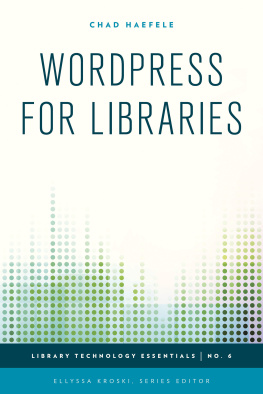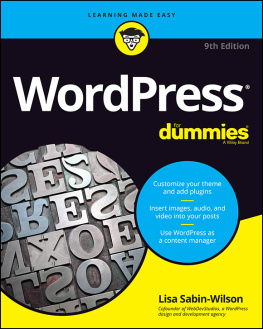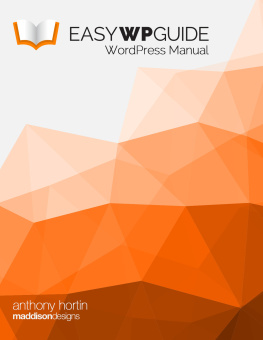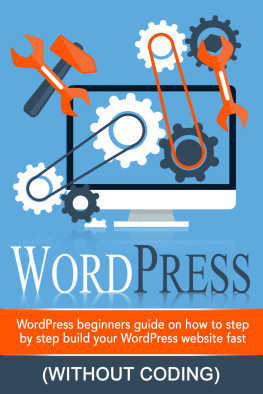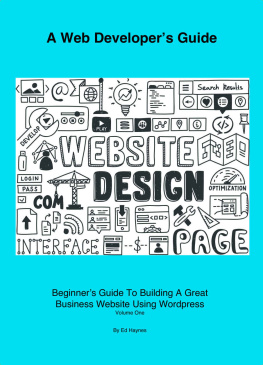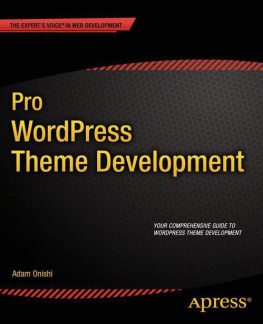Library Technology Reports
Expert Guides to Library Systems and Services
Using WordPress as a Library Content Management System
Library Technology Reports
Expert Guides to Library Systems and Services
Using WordPress as a Library Content Management System
Kyle M. L. Jones and Polly-Alida Farrington
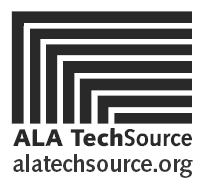
American Library Association
Library Technology Reports
ALA TechSource purchases fund advocacy, awareness, and accreditation programs for library professionals worldwide.
Volume 47, Number 3
Using WordPress as a Library Content Management System
ISBNs: 978-0-8389-5831-5 (paper); 978-0-8389-9232-6 (PDF); 978-0-8389-9233-3 (ePub); 978-0-8389-9234-0 (Mobipocket); 978-0-8389-9235-7 (Kindle)
American Library Association
50 East Huron St.
Chicago, IL 60611-2795 USA
alatechsource.org
800-545-2433, ext. 4299
312-944-6780
312-280-5275 (fax)
Advertising Representative
Brian Searles, Ad Sales Manager
ALA Publishing Dept.
312-280-5282
1-800-545-2433, ext. 5282
Editor
Dan Freeman
312-280-5413
Copy Editor
Judith Lauber
Editorial Assistant
Megan ONeill
800-545-2433, ext. 3244
312-280-5275 (fax)
Production and Design
Tim Clifford, Production Editor
Karen Sheets de Gracia, Manager of Design and Composition
Library Technology Reports (ISSN 0024-2586) is published eight times a year (January, March, April, June, July, September, October, and December) by American Library Association, 50 E. Huron St., Chicago, IL 60611. It is managed by ALA TechSource, a unit of the publishing department of ALA. Periodical postage paid at Chicago, Illinois, and at additional mailing offices. POSTMASTER: Send address changes to Library Technology Reports, 50 E. Huron St., Chicago, IL 60611.
Trademarked names appear in the text of this journal. Rather than identify or insert a trademark symbol at the appearance of each name, the authors and the American Library Association state that the names are used for editorial purposes exclusively, to the ultimate benefit of the owners of the trademarks. There is absolutely no intention of infringement on the rights of the trademark owners.

Copyright 2011 American Library Association
All Rights Reserved.
Subscriptions
alatechsource.org/subscribe
Kyle M. L. Jones is a PhD student at the University of WisconsinMadison in the School of Library and Information Studies, where his research interests are focused on e-learning informatics, traditional and untraditional online learning environments, and digital library technologies. He received his BA in English literature and secondary education from Elmhurst College in Elmhurst, Illinois, and his MLIS from Dominican University in River Forest, Illinois. He enjoys downtime with his wife, Liz, and at the historic Road America racecourse in Elkhart Lake, Wisconsin. He can be contacted by e-mail at , and on Twitter @thecorkboard.
Polly-Alida Farrington is a former academic librarian with seventeen years experience in reference, government documents, ILL, and technology. Since 1996, as principal of PA Farrington Associates, shes provided technology-related training, web project development, and consulting services to libraries, library systems, and schools. She has a keen interest in how libraries and schools are using technology and adapting to change, and loves helping people explore emerging technologies and assess how technology can help deliver better services to customers. When not in front of a computer, she can be found in her garden trying to help things grow. She can be contacted by e-mail at , and on Twitter @pollyalida.
The authors begin their exploration of WordPress by spotlighting the concerns inherent in online content management as the Web has taken on highly complex and interactive characteristics. They advise that content management and strategy as they relate to web publishing is no longer optional for libraries.
The authors discuss the use of WordPress as a content management system in libraries, highlighting its unique technical characteristics, superb user experience qualities, and extensible features, as well as providing a fair discussion of the systems flaws.
A variety of guest authorslibrarians, archivists, and educatorscontribute case studies, responses, and best practices.
Also included:
a brief history of WordPress
an introduction to the different types of content management systems
a list of resources to guide an exploration of WordPress
simple-to-follow cookbooks for best practices and choosing excellent plugins
Contents
Part 1: WordPress for Blogs, CMSs, and So Much More
Part 2: Preparation, Installation, and Initial Settings
Notes
Part 1: Extensibility via Plugins
Part 2: Look and Feel with Themes
Notes
Part 1: A Better Workflow
Part 2: Safe, Sound, Tracked
Part 3: Flexible DesignWidgetize Everything
Part 4: Enhancing the User Experience
Part 5: Roll Your Own Social Network
Notes
Creating Dynamic Subject Guides
Laura Slavin and Joshua Dodson
First-Year Seminar Blogs
Jacob Hill and Peg Cook
BuddyPress and Higher Education: An Interview with Dr. Michael Stephens and Kenley Neufeld
Kyle Jones
From LibGuides to WordPress
Paul Boger
Creating a Digital Archives with WordPress
Kelli Bogan
Ten Ways WordPress Can Improve Website UX
Aaron Schmidt and Amanda Etches-Johnson
Using WordPress to Create a Virtual School Library
Anne Robinson
Kansas Libraries on the Web
Liz Rea
Kyles and Pollys Delicious Bookmarks
Bloggers
Books
Community Sites
Mailing Lists
Premium WordPress Resources
In the past years, libraries of all types and all sizes have been engaging in online content creation. And who better to partake of such an activity than the intellectual centers of communities, campuses, and organizations? With the breadth of material at hand and knowledge workerslibrarianswilling, theres a lot to share. Stable publishing platforms have emerged for diverse needs. We have Twitter and Facebook for social sharing of information; we have sites like Blogspot and WordPress.com for blogging; we turn to open source content management systems such as Drupal for our library websites. Our online publishing needs, and the tools used to fulfill those needs, are disparate.
In this issue of Library Technology Reports, authors Kyle M. L. Jones and Polly-Alida Farrington introduce us to another excellent addition to our technology toolbox that might just surprise you with its power and form: WordPress as a content management system. Bucking its blogging roots, WordPress stands as a relevant option for library content management needs due to new features and excellent usability.
Jones and Farrington introduce you to the history and progression of WordPress, get you going with the system, help you customize it to your needs, share the greatest plugins to extend its usability and functionality, and provide a resource list to assist you in your research. Guest pieces from all types of libraries and librarians also grace the pages as exemplary models and reflections on using WordPress as a content management system.
Next page
